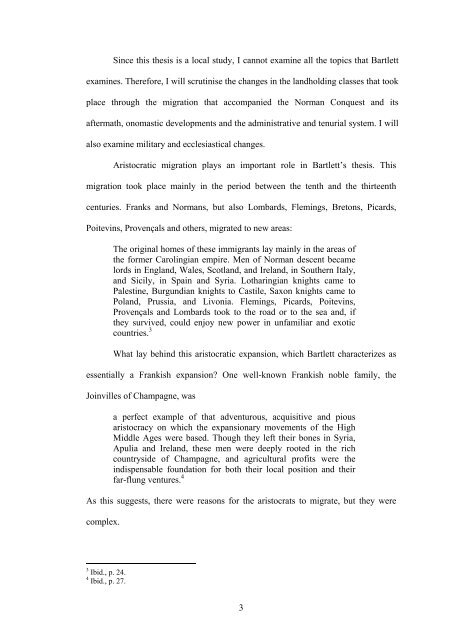I certify that I have read this thesis and have ... - Bilkent University
I certify that I have read this thesis and have ... - Bilkent University
I certify that I have read this thesis and have ... - Bilkent University
You also want an ePaper? Increase the reach of your titles
YUMPU automatically turns print PDFs into web optimized ePapers that Google loves.
Since <strong>this</strong> <strong>thesis</strong> is a local study, I cannot examine all the topics <strong>that</strong> Bartlett<br />
examines. Therefore, I will scrutinise the changes in the l<strong>and</strong>holding classes <strong>that</strong> took<br />
place through the migration <strong>that</strong> accompanied the Norman Conquest <strong>and</strong> its<br />
aftermath, onomastic developments <strong>and</strong> the administrative <strong>and</strong> tenurial system. I will<br />
also examine military <strong>and</strong> ecclesiastical changes.<br />
Aristocratic migration plays an important role in Bartlett’s <strong>thesis</strong>. This<br />
migration took place mainly in the period between the tenth <strong>and</strong> the thirteenth<br />
centuries. Franks <strong>and</strong> Normans, but also Lombards, Flemings, Bretons, Picards,<br />
Poitevins, Provençals <strong>and</strong> others, migrated to new areas:<br />
The original homes of these immigrants lay mainly in the areas of<br />
the former Carolingian empire. Men of Norman descent became<br />
lords in Engl<strong>and</strong>, Wales, Scotl<strong>and</strong>, <strong>and</strong> Irel<strong>and</strong>, in Southern Italy,<br />
<strong>and</strong> Sicily, in Spain <strong>and</strong> Syria. Lotharingian knights came to<br />
Palestine, Burgundian knights to Castile, Saxon knights came to<br />
Pol<strong>and</strong>, Prussia, <strong>and</strong> Livonia. Flemings, Picards, Poitevins,<br />
Provençals <strong>and</strong> Lombards took to the road or to the sea <strong>and</strong>, if<br />
they survived, could enjoy new power in unfamiliar <strong>and</strong> exotic<br />
countries. 3<br />
What lay behind <strong>this</strong> aristocratic expansion, which Bartlett characterizes as<br />
essentially a Frankish expansion? One well-known Frankish noble family, the<br />
Joinvilles of Champagne, was<br />
a perfect example of <strong>that</strong> adventurous, acquisitive <strong>and</strong> pious<br />
aristocracy on which the expansionary movements of the High<br />
Middle Ages were based. Though they left their bones in Syria,<br />
Apulia <strong>and</strong> Irel<strong>and</strong>, these men were deeply rooted in the rich<br />
countryside of Champagne, <strong>and</strong> agricultural profits were the<br />
indispensable foundation for both their local position <strong>and</strong> their<br />
far-flung ventures. 4<br />
As <strong>this</strong> suggests, there were reasons for the aristocrats to migrate, but they were<br />
complex.<br />
3 Ibid., p. 24.<br />
4 Ibid., p. 27.<br />
3
















